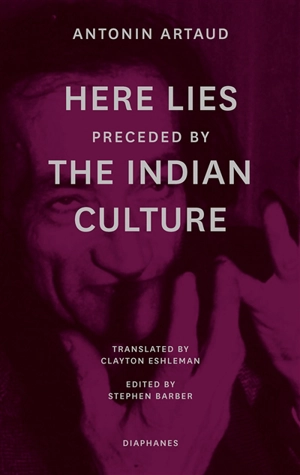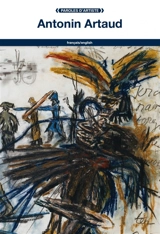
Here lies. Ci-gît. Indian culture. La culture indienne
Antonin Artaud
Versailles, Lyon 2ᵉ, Lyon 6ᵉ...
Ce que dit l'éditeurThis volume collects two of Antonin Artaud's foremost poetic works from the last period of his life. He wrote both works soon after his release from the psychiatric hospital of Rodez and his return to Paris, and they were published during the flurry of intensive activity and protests against his work's censorship. Indian Culture is the first and most ambitious work of Artaud's last period. It deals with his travels in Mexico in 1936 where Artaud sets aside his usual preoccupations with peyote and the Tarahumara peoples' sorcerers to directly anatomize his obsessions with gods, corporeality, and sexuality. Here Lies is Artaud's final declaration of autonomy for his own body from its birth to its imminent death, won at the cost of multiple battles against the infiltrating powers amassed to steal that birth and death away from him. Both works demonstrate Artaud's final poetry as a unique amalgam of delicate linguistic invention and ferociously obscene invective. Here Lies preceded by Indian Culture was translated by the award-winning translator Clayton Eshleman, widely seen as the preeminent translator into English of Artaud's work, with its profound intensity and multiply nuanced language. For the first time since its first publication, this bilingual edition presents the two works in one volume, as Artaud originally intended. This edition also features a contextual afterword by Stephen Barber. |
RésuméEcrits après la sortie d'Artaud de l'asile de Rodez, ces deux poèmes sont deux textes majeurs de l'oeuvre des dernières années du Momo. La culture indienne est liée à son voyage de 1936 au Mexique et ses obsessions pour le peyolt et les Tarahumaras. Ci-gît apparaît comme la dernière pierre de la réflexion du poète sur son identité, où il affirme l'autonomie de son esprit sur son corps. ©Electre 2025 |
Caractéristiques Auteur(s) Éditeur(s) Date de parution
5 novembre 2021
Rayon
Poésie et théâtre
Contributeur(s) Clayton Eshleman
(Traducteur), Clayton Eshleman
(Editeur scientifique (ou intellectuel)), Stephen Barber
(Editeur scientifique (ou intellectuel)), Stephen Barber
(Postfacier) EAN
9783035803648
Nombre de pages
70
pages
Reliure
Broché
Dimensions
19.0
cm x
12.0
cm x
0.6
cm
Poids
120
g
|

















